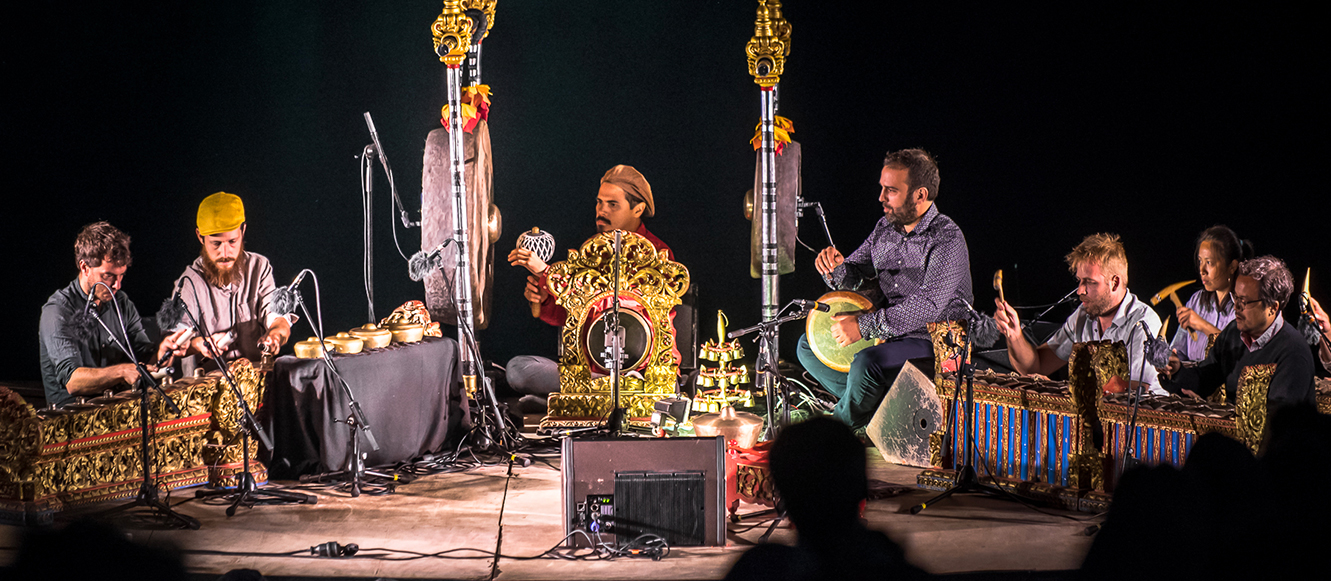The fruit of an encounter between Franco-Lebanese percussionist Wassim Halal and eight members of the Balinese gamelan Puspawarna, Polyphemus is an immersion into unknown territory, somewhere between the Middle East and Indonesia, carried by the rhythms of multiplied percussion.
Highlighting the potential of this immense collective instrument, the gamelan, Polyphemus seeks to unite opposing elements: rhythmic rigor and freedom, silence and sonic intensity, spontaneity and mastery. Through this alchemy, an unprecedented dialogue is born between the traditions of Balinese gamelan and the Arab sounds embodied by Wassim Halal's darbuka. Propelled by rhythmic flights of hallucinatory variation evoking the repetitive dimensions of today's music, Polyphème weaves a thrilling and eloquent exchange. It offers a succession of off-the-beaten-track compositions and improvisations, sprinkled with haunting leitmotifs.
Following the release of their album "Le rêve de Polyphème" (Polyphemus' Dream), this new opus features an original creation, "Ambigu", composed by internationally renowned Balinese composer Dewa Alit. His works, woven with surgical precision, create spellbinding soundscapes, oscillating between meditative contemplation and jubilant effervescence.
Production
Pantcha Indra
Coproduction
GMEM ; Détours de Babel ; Musiques démesurées ; Ateliers Médicis
Support
Drac ; Spedidam ; Adami ; Ministère de la culture pour l'aide à la création mutualisée 2024
In partnership with
La Friche la Belle de Mai
Polyphemus
Ensemble
Born of the encounter between Franco-Lebanese percussionist Wassim Halal and eight musicians from the Balinese gamelan Puspawarna, Polyphème explores a lush, sophisticated and resolutely hybrid sound universe. This project highlights the innumerable potentialities of the gamelan, this monumental collective instrument, playing on precious textures and embedded polyrhythms. Through an original and fertile dialogue, the Arab tradition, embodied by Wassim Halal's darbuka, blends intimately with the sounds of the Balinese gamelan. Polyphème's repertoire is made up of original creations and improvisations revolving around notions of rhythm and temporality, immersing the audience in a magnetic universe of sound.
The performances, driven by spellbinding leitmotifs, weave hypnotic patterns of dialogue between darbuka, gongs and metallophones. More than a simple encounter between two musical traditions, Polyphème gives birth to a common language, built on complex architectures and original sound materials. Pulsed by hallucinatory rhythmic variations, its compositions blur geographical and idiomatic boundaries, enriching and questioning traditions to open up new horizons."
Dewa Alit
Traditional gamelan musician, composer
Born into a family of artists in the village of Pengosekan in Bali, Dewa Alit grew up immersed in Balinese music from an early age. His father Dewa Nyoman Sura and older brother Dewa Putu Berata were his most influential gamelan teachers. He began performing at the age of 11, and by 13 was playing in his village's adult group, Tunas Mekar Pengosekan. From 1988 to 1995, he played in the internationally renowned Ubud village Gamelan Semara Ratih, and toured internationally.
As a composer, Dewa Alit is widely recognized as the leading figure of his generation in Bali. His "Geregel" (2000) was so influential that it was the subject of a 50-page review in Wayne Vitale's Perspectives on New Music - Winter 2002. One of his compositions written for the Boston-based gamelan group Galak Tika, Semara Wisaya, was performed at New York's Carnegie in 2004, and another, Pelog Slendro, was presented at the Bang on a Can Marathon in June 2006. His compositions for non-gamelan ensembles include music for MIT's Gamelan Electrika, Talujon Percussion (USA) and Ensemble Modern (Frankfurt, Germany). Dewa Alit founded his own gamelan group in 2007, Gamelan Salukat, seeking a more direct way to express his approach to new gamelan music, and performing on a new set of instruments tuned and designed by himself. As a collaborator, Dewa Alit has worked with musicians and dancers from all over the world. These include a contemporary theater production, Théâtre Annees Folles (director: Alicia Arata Kitamura, Tokyo), butoh dancer Ko Murobushi, contemporary dancers Min Tanaka and Kaiji Moriyama, and noh master Reijiro Tsumura. Dewa Alit was the gamelan director in Evan Ziporyn's opera "A House in Bali" with his Gamelan Salukat, and toured with "Bang on a Can All-Stars" in the USA in 2009 and 2010. He has been regularly invited to teach and compose outside Bali, notably at the University of British Columbia, the Massachusetts Institute of Technology and Helena College in Perth.
- www.dewaalitsalukat.com/
"A gentle delirium in which a tangle of sounds, a rhythmic arrangement that makes you think of strange soundtracks: here a tantric western, there a surrealist thriller. You might think you're listening to a tampered keyboard or a saturated guitar, but it's just the marvelous prodigies of the Balinese all-in-one.
- Libération
"A full, poetic and sophisticated dream of Polyphemus, developed live with the musicians of the Parisian ensemble puspawarna, on a small-scale gamelan that makes a big impact."
- Télérama
Friche la Belle de Mai (Grand Plateau)
41 Jobin Street13003
Marseille
RATES
Full: 8€
Reduced: 6€ *
* Young people aged 12 - 25, students, jobseekers, recipients of minimum social benefits, intermittent workers, seniors aged 65 and over - with proof.
Evening pass * : 10€
(*including Grand8 in 16 at 7pm)
DURATION
approx. 1h20
Dewa Alit
&
Théo Mérigeau
WassimHalal
Jérémie Abt
SvenClerx
composition
Wassim Halal
darbuka
Jérémie Abt,
Antoine Chamballu,
SvenClerx,
Théo Mérigeau,
Raúl Monsalve,
Christophe Moure,
A.A.B.G. Krishna Putra Sutedja,
Hsiao-yunTseng
musicien-ne-s gamelan Puspawarna
Emmanuel Le Duigou
his





